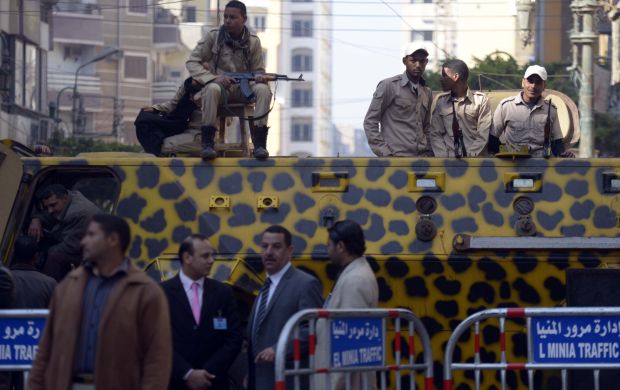
Egyptian policemen stand guard outside the courthouse on March 25, 2014 in the central Egyptian city of Minya, during a session of the trial of some 700 Islamists charged with deadly rioting in an Egypt city. (AFP Photo)
London and Cairo, Asharq Al-Awsat—Egyptian authorities have put an additional 683 members of the Muslim Brotherhood, including Supreme Guide Mohamed Badie, on trial on Tuesday, a day after 528 Brotherhood members were sentenced to death.
While not all the charges have been clear, many of the 683 defendants will be charged with murder or attempted murder, as well as membership of a terrorist organization. Egypt designated the Brotherhood a terrorist organization in December, claiming it is responsible for a series of attacks on state infrastructure and security figures, something that the group denies. Most of the charges are in connection with a mob attack on a police station in the town of El-Adawa on August 14 last year.
Defense lawyers are reportedly boycotting Tuesday’s trial after they were prevented from presenting evidence or making a case in Monday’s trial. The same judge is presiding over both trials, sparking fears that the second trial will witness a similar outcome to the first.
The trials have been condemned both in Egypt and internationally, mainly over the speed of Monday’s trial, which was concluded in only two sessions, as well as the number of defendants being tried in absentia. Of those being tried on Tuesday, 618 remain at large.
Former Egyptian justice minister Ahmed Mekki told Asharq Al-Awsat that the decision to sentence 528 people to death “has nothing to do with the law,” adding that it “cheapens human life.”
The Mursi-era justice minister is a well-respected technocrat who formerly served as deputy head of the Court of Cassation, the highest appeal court in Egypt.
He criticized the decision to sentence so many people to death in one trial, saying the decision serves to “undermine confidence in the judiciary and lessen the people’s hopes in justice.”
He informed Asharq Al-Awsat that the decision may give “legal basis for those who want to issue a complaint about the Egyptian judiciary, opening the door to international judicial intervention [in Egypt].”
Speaking to Turkey’s Anadolu News Agency on Tuesday, the former minister went further, saying: “These rulings are a call for violence,” adding, “If the doors to justice are closed, everyone will take the law into his own hands.”
The trials have also sparked international outrage, with Western officials mainly criticizing the fairness of Monday’s trial and the mass imposition of the death penalty on charges relating to the death of only one police officer.
On Tuesday, the UN human rights office said the death sentences were a “breach of international law.”
In a US State Department press briefing on Monday, a spokeswoman said: “It simply does not seem possible that a fair review of evidence and testimony, consistent with international standards, could be accomplished with over 529 defendants in a two-day trial.”
The German foreign minister called on Tuesday for further such mass trials to be suspended, in light of the fact that this week’s trials of 1,200 people detained in connection with last summers’s clearing of pro-Brotherhood sit-ins at Rabaa Al-Adawiya and Al-Nahda squares are less than a tenth of the 16,000 people arrested.
But an Egyptian judicial official involved in Monday’s case speaking to the Associated Press dismissed the criticism, saying, “We are in exceptional circumstances. We don’t have time to summon each and every defendant, prove their presence, and confirm who are their lawyers.”
The Egyptian Ministry of Justice has also responded to the criticism in a statement noting that sentences can be appealed to the Court of Cassation. Under Egyptian law, the country’s Grand Mufti must also ratify the sentences, which is expected before April 28 according to Egypt’s Al-Ahram newspaper. Any appeals could only happen after the Grand Mufti’s ratification.
Mohamed Towson, a lawyer for eight of the accused in Monday’s trial, told Asharq Al-Awsat that the decision was “nonsensical,” adding that he expects the decision to be overturned on appeal and a retrial to take place.
Additional reporting from Cairo by Mohamed Hassan Shaban.
